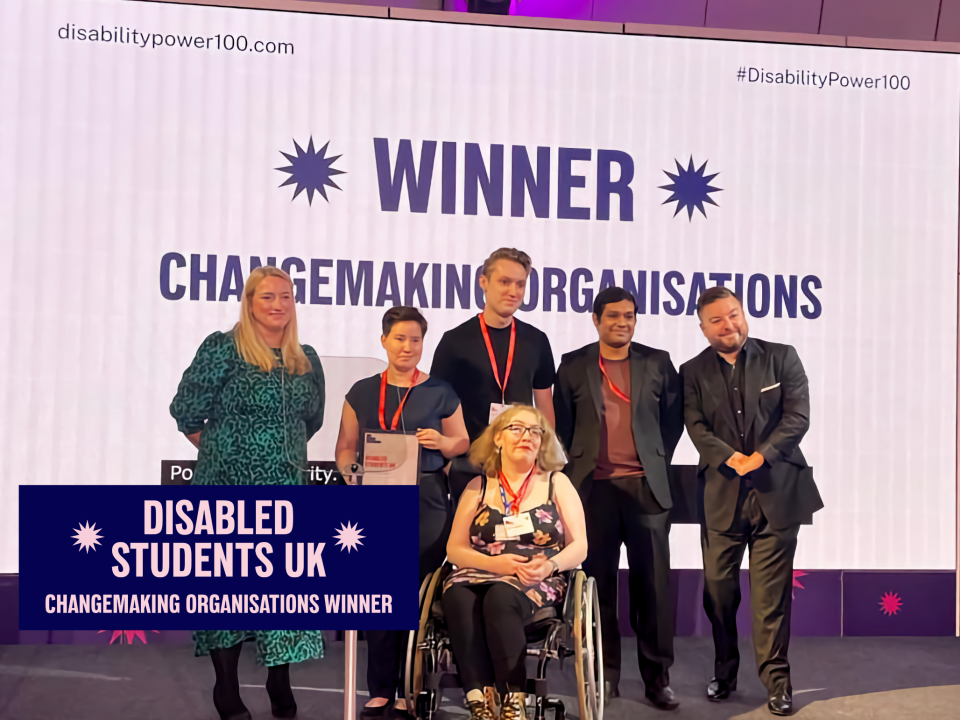
Disabled Students UK Conducts Largest Survey on Accessibility in Higher Education
24/07/2023
Disabled Students UK crowned number one changemaking organisation
09/11/2023
New Report
Improving the experience of disabled PhD students in STEM
Disabled Students UK has produced a new report investigating the experiences of disabled postgraduate research (PGR) students, a previously understudied group that has increased in size by more than 50% in the last 5 years, today making up 20% of PGR home students (HESA, 2023).
The report, which focuses especially on STEM students working in the life sciences, was created in collaboration with Pete Quinn Consulting and the BBSRC funded Oxford Interdisciplinary Bioscience Doctoral Training Partnership. The researchers found that out of 192 survey participants UK wide, only a third (33%) felt they had received the support they needed to be on an equal footing with their non-disabled peers.
Following doctoral focus groups and structured conversations with doctoral training programme staff and associated colleagues, the report recommends 4 solutions specific to the needs of disabled doctoral students:
1. Address gaps in the provision of individualised support and clarify which bodies are responsible
The web of disability support for research students is less developed than that offered to taught students. Less than half of disabled PhD students felt it was clear where they should get their disability support from. For instance, there is a misconception among some staff and students that international UKRI funded students are not eligible for the Disabled Students’ Allowance (DSA), which they are.
Supporting international doctoral students is especially important to improve disability disclosure numbers. Doctoral home students now declare a disability to the same extent as undergraduate students, however international student declarations are lagging behind (HESA, 2023). To incentivise disclosure we must ensure that international students are aware that they have a right to the same level of support as home students, and that doctoral students have a right to the same level of support as taught students, whether that is funded by DSA or by their institution.
Who generally funds doctoral students’ disability support
| UKRI funded | Not UKRI funded | |
| Home students | UKRI DSA + Research organisation | Same DSA funder as undergraduate students + Research organisation |
| International students | UKRI DSA + Research organisation | Research organisation only |
Survey respondents expressed that the support offered by the Disabled Students Allowance (DSA) and universities’ Disability Services was often relevant only to taught students, such as being offered the opportunity to record lectures. The number of disabled students who receive appropriate disability support can be improved by ensuring not only that all parties know which body is responsible for which support but also through educating Needs assessors and Disability Services staff about the specific needs of disabled doctoral students.
2. Strengthen the crucial supervisor-supervisee relationship
Our survey shows that the supervisor-supervisee relationship is uniquely important for disabled students’ sense of support and belonging. PhD students whose supervisors were accepting and supportive of their disability were 12 times more likely to state that they had the support they needed.
We can empower supervisors by better connecting them to students’ disability support staff, offering them accessibility training, providing better support for supervisors’ own needs and improving safeguards to prevent this crucial relationship from going wrong.
The supervisory relationship was one of the aspects of the degree that was most often rated positively. However, some students had negative experiences, and due to the unique importance of this relationship these experiences were likely to have severe consequences such as students leaving their degree.
The upcoming “Research SuperVision Project” (RSVP) led by the University of York, which is set to develop professional development resources for supervisors offers an excellent opportunity to take the lessons from this report onboard and embed accessibility and disability inclusion into best practice guidance for supervisors (UK Council for Graduate Education, 2022).
3. Make the physical and sensory environment more accessible
The physical/sensory environment on campus was the aspect of the PhD experience that was found to be inaccessible by the largest number of doctoral STEM students surveyed (50%). Given this it is perhaps unsurprising that students with mobility difficulties were the least likely to have a sense of belonging at their institution. However labs and open plan workspaces were often thought to be inaccessible by other disability groups as well, such as those who were neurodivergent.
The accessibility of the physical and sensory environment can be improved by using universal design to create enabling workspaces for staff and doctoral students with mobility and sensory differences. In addition it is important that funding is earmarked for ergonomic furniture and equipment, as this is not currently provided by UKRI DSA (unlike the DSA accessed by taught students).
4. Allow students to study at a pace that suits different bodies and minds
We found a lack of alternatives for disabled students that need to work at a slower pace consistently, or slow down temporarily. Students who felt that their funder was flexible, accommodating and valued their wellbeing were less likely to say that undertaking their PhD had negatively impacted their health. Funders can provide disabled students with the opportunity to study at a pace that does not negatively impact their health and wellbeing by adjusting their policies around sick leave and part time studies in keeping with common employment practices, offering greater flexibility around extensions and part time studies and offering full time stipends to disabled students who are unable to study full time are still able to survive.
In addition to the four recommendations above, the report also presents three recommendations that are relevant to disabled students beyond doctoral studies and accord with findings in previous reports (DSUK, 2022; Higher Education Commission & Policy Connect, 2020):
- Reduce the administrative burden students have to undertake in order to be offered support
- Resource decentralised bodies such as academic departments and doctoral training partnerships to enable them to better implement agreed support
- Cultivate a supportive culture to ensure that disabled students feel a sense of belonging and have somewhere to turn when issues arise.
Mette Anwar-Westander, DSUK lead on the report comments: “Disabled doctoral students are currently among the least well supported groups in Higher Education. Our hope is that doctoral training partnerships, research organisations such as universities, and funders such as UKRI, will take the 7 lessons from our report onboard to understand how they can better support disabled doctoral students, ultimately improving their admission, retention and progression.”
The new report was funded by UKRI-BBSRC and the BBSRC-funded Oxford Interdisciplinary Bioscience Doctoral Training Partnership. UKRI’s recently published report “A New Deal for Postgraduate Researchers” (UKRI, 2023) states that reviewing support for disabled students is one of UKRI’s immediate priorities.
Download the report

References
Disabled Students UK. (2022). Going Back Is Not A Choice. http://disabledstudents.co.uk/not-a-choice/
HESA. (2023b) Higher Education Student Statistics: UK, 2021/22 – Student numbers and characteristics . HESA. https://www.hesa.ac.uk/news/19-01-2023/sb265-higher-education-student-statistics/numbers
Higher Education Commission & Policy Connect. (2020). Arriving At Thriving: Learning from disabled students to ensure access for all. https://www.policyconnect.org.uk/research/arriving-thriving-learning-disabled-students-ensure-access-all
Pugh, E. (2023). Assessment of UKRI’s Terms and conditions of Training Grants from an Equality, Diversity and Inclusion Perspective Prepared for UK Research and Innovation. https://www.ukri.org/wp-content/uploads/2023/04/UKRI-280423-Assessment-of-UKRI-Terms-and-conditions-of-Training-Grants-from-an-Equality-Diversity-and-Inclusion-Perspective.pdf
UKRI. (2023). A New Deal for Postgraduate research: Response to call for input. UKRI. https://www.ukri.org/wp-content/uploads/2023/09/UKRI-26092023-A-New-Deal-for-Postgraduate-Research-Response-to-the-Call-for-Input.pdf



